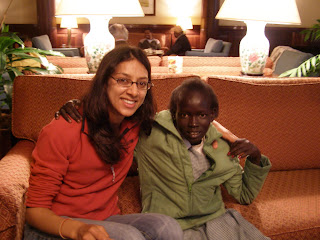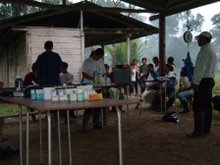
I’ve read quite a few novels this summer, but Ayaan Hirsi Ali’s Infidel has probably been the most provocative. While I oppose with her fundamental conclusions about Islam, I do agree with some of her injunctions against traditional Muslim culture.
That fundamental point of disagreement is this: I think she fatally misinterprets Islamic tradition as being part of the Quran—the word of God is NOT the same as what your imam or Quran school teacher tells you, necessarily, nor is the word of the Prophet in Hadith. She’s had some seriously crooked people/institutions rear her in their seriously crooked (mis)interpretation of Islam.
Anyway, while I think she takes her frustration out on the Quran when she should be directing that energy against opportunist, backwards interpreters of the scripture, I found her account of refugee camp life and her criticism of faith-based schools particularly interesting, especially as I was interacting with kids who had been through this unfathomable experience. I wanted to share some excerpts:
“The UN began to distribute food; basically they handed rations to people who claimed to be clan leaders, and these people either kept it for their own families or sold it.”
“It began happening al the time: Kenyan soldiers came at night to rape Somali women who were alone without protectors. And then all these women would be shunned and left to die.
This is what my grandmother had meant when she warned me: if you are a Somali woman alone, you are like a piece of sheep fat in the sun. Ants and insects crawl all over you, and you cannot move or hide; you will be eaten and melted until nothing is left but a thin smear of grease. And she also warned us that if this happened, it would be our fault.
It was horrible. Everyone in the camp called themselves Muslims and yet nobody helped these women in the name of Allah. Everyone was praying…but no one showed compassion.”
And on Muslim schools (this is the author’s opinion; I personally know nothing about Muslim schools but imagine it’s similar to Islamic tradition/culture):
“Muslim schools reject the values of universal human rights. All humans are not equal in a Muslim school. Moreover, there can be no freedom of expression or conscience. These schools fail to develop creativity—art, drama, music—and they suppress the critical faculties that can lead children to question their beliefs. They neglect subjects that conflict with Islamic teachings, such as evolution and sexuality. They teach by rote, not question, and they instill subservience in girls. They also fail to socialize children to the wider community.”
I believe strongly in gender equity, like Hirsi Ali, but I also think men and women were created to fill different roles in life (I’m thinking particularly about family life). Different, but equal. I also believe in creationism—to me, evolution is an undeniable truth, but within a species—but I agree with the author in that whether you believe it’s true or not, children need to be educated about the ideas that exist in the world they’re living in. That’s the only way they can make real choices and be intellectually and spiritually strong enough to believe in something worth standing up for.

 State House Girl's High School in Nairobi
State House Girl's High School in Nairobi
 The first day in Nakuru, introducing ourselves. Mario is to my left, Panchol to my right. We held the interviews in a church at an orphanage.
The first day in Nakuru, introducing ourselves. Mario is to my left, Panchol to my right. We held the interviews in a church at an orphanage. At the Sudanese community office discussing applications today.
At the Sudanese community office discussing applications today. Agou Jon and Mayen. I really love working with them!
Agou Jon and Mayen. I really love working with them! Mom and Kwai. Indispensable!
Mom and Kwai. Indispensable! Eliza and me after an interview. She is just starting secondary school and is disabled. She was so shy, but put her arm around me for the photo. A very sweet, determined girl.
Eliza and me after an interview. She is just starting secondary school and is disabled. She was so shy, but put her arm around me for the photo. A very sweet, determined girl.



